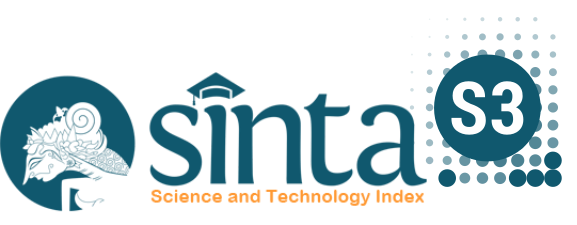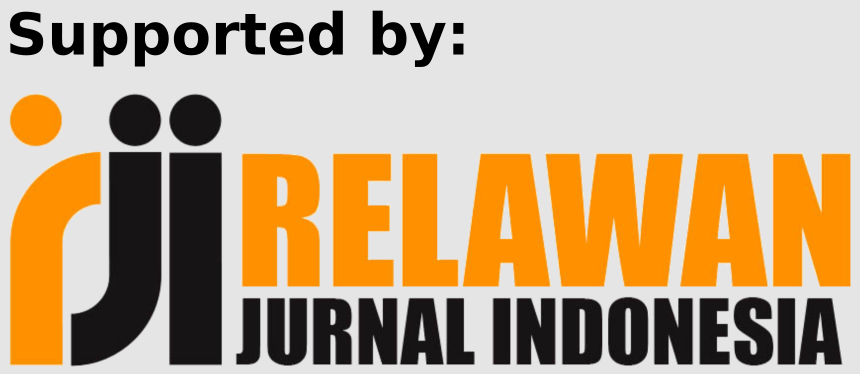The relationship between parenting style and social development among toddlers in Yogyakarta
DOI:
https://doi.org/10.31101/jhtam.1900Abstract views 2149 times
Keywords:
Parenting, Preschool, Yogyakarta, Social DevelopmentAbstract
Downloads
References
Ansari, & Gershoff. (2016). Parent involvement in head start and children’s development: Indirect effects through parenting. J. Marriage Fam, 78(1), 562–579.
Arnold, Kupersmidt, Voegler-Lee, & Marshall. (2012). The association between preschool children’s social functioning and their emergent academic skills. Early Child. Res. Q.
Augustine, Prickett, Kendig, & Crosnoe. (2015). Maternal education and the link between birth timing and children’s school readiness. Social Science Quarterly, 96(1), 970–984.
Aunola, Ruusunen, Viljaranta, & Nurmi. (2015). Parental affection and psychological control as mediators between parents’ depressive symptoms and child distress. Journal of Family Issues, 36(1), 1022–1042.
Ball, M., Weaver, C., & ... (2016). Healthcare Information Management Systems. In Journal of Information Systems Education (Vol. 14, Issue 4). https://doi.org/10.1007/978-3-319-20765-0
Barbara Gross Davis. (2009). Tools for Teaching. Jossey-Bass.
Baumrind, Arzelere, Owens, Baumrind, Larzelere, & Owens. (2013). Effects of Preschool Parents’ Power Assertive Patterns and Practices on Adolescent Development Effects of Preschool Parents’ Power Assertive Patterns and Practices on Adolescent Developmen.
Boca, D., Flinn, & Wiswall, M. (2016). Transfers to households with children and child development. Econ. J., 126(1), F136–F183.
Boediman, & Desnawati. (2019). The Relationship between Parenting Style and Children’s Emotional Development among Indonesian Population. Jurnal Ilmiah Psikologi, 10(1), 17–24.
Bornstein, & Bornstein. (2014). Parenting Styles and Child Social Development 3.
Brooks-Gunn, Han, & Waldfogel. (2010). Firstyear maternal employment and child development in the first 7 years. Monographs of the Society for Research in Child Development, 75(2).
Campbel, Conti, Heckman, Moon, Pinto, Pungello, & Pan. (2014). Early childhood investment substantially boost adult health. Science, 343(1), 1478–1485.
Claessens, & Dowsett. (2014). chGrowth and Change in Attention Problems, Disruptive Behavior, and Achievement from Kindergarten to Fifth Grade. Early Childhood Social and Emotional Development: Advancing the Field of Measurement. Journal of Applied Developmental Psychology, 25(12), 2241–2251.
Dalwood, P., Marshall, S., Burrows, T. L., McIntosh, A., & Collins, C. E. (2020). Diet quality indices and their associations with health-related outcomes in children and adolescents: an updated systematic review. European Journal of Nutrition, 19(1). doi: 10.1186/s12937-020-00632-x.
Denham, & Brown. (2010). “Plays nice with othersâ€: Social–emotional learning and academic success. Early Education &Development, 21(1), 652–680.
Depkes-RI. (2012). Health Profile of Republic of Indonesia.
Duncan, Kenneth, Lee, & Rosales-Rueda, M. (2018). Maternal Age and Child Development. Physiology & Behavior. 176(1), 139–148.
Eisenberg, Spinrad, & Eggum. (2010). Emotion-related self-regulation and its relation to children’s maladjustment. Annual Review of Clinical Psychology, 6, 495–525.
Ering, Akpan, & Emma-Echiegu. (2014). Mothers Employment Demands and Child Development: An Empirical Analysis of Working Mothers in Calabar Municipality. American International Journal of Contemporary Research, 4(1), 184–191.
Fletcher, Walls, Cook, & Madison. (2010). Parenting style as a moderator of associations between maternal disciplinary strategies and child well-being. Journal of Family Issues, 29, 1724.
Halle, Hair, Burchinal, Anderson, & Zaslow. (2012). In the running for suc- cessful outcomes: Exploring the evidence for thresholds ofschool readiness. Technical report (Retrieved from Office of the Assistant Secretary for Planning and Evaluation, U.S. Department of Health and Human.
Hinkley, Brown, Carson, & Teychenne. (2018). Cross sectional associations of screen time and outdoor play with social skills in preschool children. 13(4).
Hosokawa, R., & Katsura, T. (2017). A longitudinal study of socioeconomic status, family processes, and child adjustment from preschool until early elementary school: the role of social competence. Child and Adolescent Psychiatry and Mental Health. 11(1). https://doi.org/10.1186/s13034-017-0206-z
Houtrow, A., Jones, J., Ghandour, R., Strickland, B., & Newacheck, P. (2012). articipation of Children with Special Health Care Needs in School and the Community. Academic Pediatrics. 12(4), 326–334. https://doi.org/10.1016/j.acap.2012.03.004
Jaafar, & Bilyk. (2013). The Journal of Social Social Skills , Friendship and Happiness : A Cross-Cultural Investigation. The Journal of Social Psychology, 2(1), 27–41.
Jabeen, Anis-ul-Haque, & Riaz. (2013). Parenting styles as predictors of emotion regulation among adolescents. Pakistan Journal of Psychological Research, 28(1), 25–105.
Janus, J., & Moerschel, S. K. (2010). Evaluation of Anemia in Children. American Family Physician. 81(12), 1462–1471.
Kern, & Jonyniene. (2012). Psychometric properties of the Lithuanian version of the parenting style and dimensions questionnaire (PSDQ): Pilot study. The Family Journal Counseling and Therapy for Couples Dan Families, 20(2), 205–214.
Kol. (2016). The Efects off The Parenting Styles On Social Skills Of Children Aged 5-6. 4(2), 49–58.
Leigh, & Gong. (2010). Does maternal age affect children’s test scores? Australian Economic Review. 43(1), 12–27.
Lombardi, & Coley. (2017). Early Maternal Employment and Children ’ s Academic and Behavioral Skills in Australia and the United Kingdom. 1–19.
Lucas-Thompson, R. G., Lunkenheimer, E. S., Dumitrache, A. (2017). Associations Between Marital Conflict and Adolescent Conflict Appraisals, Stress Physiology, and Mental Health. Journal of Clinical Child and Adolescent Psychology : The Official Journal for the Society of Clinical Child and Adolescent Psychology, America. 46(3), 379–393. https://doi.org/10.1080/15374416.2015.1046179
Luo, Jia, Yue, Zhang, Lyu, & Shi. (n.d.). Passive parenting and its association with early child development. Early. Child. Dev. Care, 78, 50–80.
Mensah, & Kuranchie. (2013). Influence of Parenting Styles on the Social Development of Children. Acad. J. Interdiscip. Stud.
Mirzaee, Khadijeh, Ghadikolaee, S. O., & Shakeri., M. T. (2015). Maternal Knowledge on Postpartum Care in Healthcare Centers of Mashhad, Iran in 2013.
Moffitt, Arseneault, Belsky, Dickson, Hancox, Harrington, & Caspi. (2011). A gradient ofchildhood self-control predicts health, wealth, and public safety. Proceedings Ofthe National Academy OfSciences Ofthe United States OfAmerica, 108(7), 2693–2698.
Nezhad. (2013). Analysis of Mothers Employment and its influence on children’s’ Training in Familyâ€. Current Research Journal of Biological Sciences, 5(1), 5–12.
Perna, L., Bolte, G., Mayrhofer, H., Spies, G., & Mielck, A. (2010). The impact of the social environment on children’s mental health in a prosperous city: an analysis with data from the city of Munich. BMC Public Health. 10(1), 199. https://doi.org/10.1186/1471-2458-10-199
Qi. (2017). A new isoflavone from the roots of Ficus auriculata. Natural Product Research. http://dx.doi.org/10.1080/14786419.2017.1329728
Raposa, E., Hammen, C., Brennan, P., & Najman, J. (2014). The Long-Term Effects of Maternal Depression: Early Childhood Physical Health as a Pathway to Offspring Depression. Journal of Adolescent Health. 54(1), 88–93. https://doi.org/10.1016/j.jadohealth.2013.07.038
Ren, Hu, & Song. (2019). Child routines mediate the relationship between parenting and social-emotional development in Chinese children. Child. Youth Serv. Rev. 98(1), 1–9.
Rinaldi, & Howe. (2012). Mothers’ and fathers’ parenting styles and associations with toddlers’ externalizing, internalizing, and adaptive behaviors. Early Childhood Research Quarterly, 27, 266–273.
Romano, Babchishin, Pagani, & Kohen. (2010). School readiness and later achievement: Replication and extension using a nationwide Canadian survey. Developmental Psychology, 46(5), 995–1007.
Saltalı, & Arslan. (2012). Parent’s attitudes as a predictor of preschoolers’ social competence and introverted behavior, Elementary Education Online. 11(3), 729–737.
Sels, Ceulemans, Bulteel, & Kuppens. (2016). Emotional Interdependence and Well-Being in Close Relationships.
Serbin, Hubert, Hastings, Stack, & Schwartzman. (2014). The influence of parenting on early childhood health and health care utilization. Journal of Pediatric Psychology, 39(10), 1161–1174.
Simkiss. (2013). Validation of the mothers object relations scale in 2-4 year old children and comparison with the chil-parent relationship scale. Helath and Quality of Life Outcomes.
Singh. (2018). Impact of Working Mothers on their Children ’ s Development. -3.
Tatli, & Pirpir. (2015). Investigation of the effects of the relationships of children attending pre-school education institutions with their teachers on their social skill levels. The Journal of Academic Social Science Studies, 31(1), 429–441.
Zarra, Kaisa, Noona, & M, S. (2014). Social withdrawal in children moderates the association between parenting styles and the children’s own socioemotional development. Journal of Child Psychology and Psychiatry and Allied Discipline, 55(11), 1260–1269.
Zheng, & McMahon. (2019). Lability in Parental Warmth in Childhood: Antecedents and Early Adolescent Outcomes. J. Clin Child Adolecs, 1–13.
Zhong, Gao, Liu, Huang, & Luo. (2019). Quantity—Quality Trade-Off and Early Childhood Development in Rural Family: Evidence from China’s Guizhou Province. Int. . . Environ. Res. Public Health, 16(1), 1307.
Zhong, He, Chen, & Luo. (2020). Relationships between parenting skills and early childhood development in rural households in western China. International Journal of Environmental Research and Public Health, 17(5).
Downloads
Published
How to Cite
Issue
Section
License
Authors who publish with Journal of Health Technology Assessment in Midwifery agree to the following terms:
- Authors retain copyright and grant the journal right of first publication with the work simultaneously licensed under a Creative Commons Attribution License (CC BY-SA 4.0) that allows others to share the work with an acknowledgment of the work's authorship and initial publication in this journal.
- Authors are able to enter into separate, additional contractual arrangements for the non-exclusive distribution of the journal's published version of the work (e.g., post it to an institutional repository or publish it in a book), with an acknowledgment of its initial publication in this journal.
- Authors are permitted and encouraged to post their work online (e.g., in institutional repositories or on their website) prior to and during the submission process, as it can lead to productive exchanges, as well as earlier and greater citation of published work.

Journal of Health Technology Assessment in Midwifery is licensed under a Creative Commons Attribution-ShareAlike 4.0 International License..













